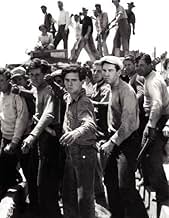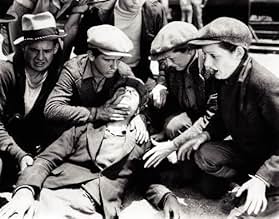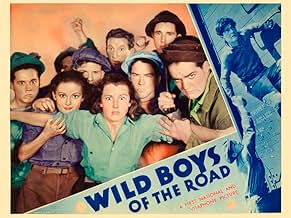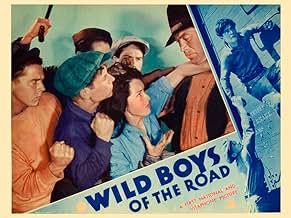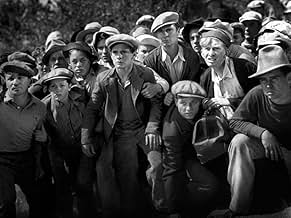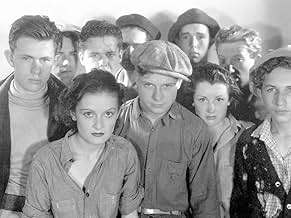Adicionar um enredo no seu idiomaIn the depths of the Depression, two teenage boys strike out on their own in order to help their struggling parents and find life on the road tougher than expected.In the depths of the Depression, two teenage boys strike out on their own in order to help their struggling parents and find life on the road tougher than expected.In the depths of the Depression, two teenage boys strike out on their own in order to help their struggling parents and find life on the road tougher than expected.
- Direção
- Roteiristas
- Artistas
- Prêmios
- 1 vitória no total
- Sally
- (as Dorothy Coonan)
- Boy
- (não creditado)
- Police Sergeant
- (não creditado)
- Policeman in Court
- (não creditado)
- Brakeman Throwing Stones
- (não creditado)
- Youth in Line-up
- (não creditado)
Avaliações em destaque
The movie wouldn't work so well without the contrast the first half-hour provides. Darro and friends are typical middle-class teens, fun-loving and care-free. It's a world of proms, necking parties, and harmless pranks. Then without warning things change. Why they change is never really explained which is the way it should be. For most kids knew nothing of stock markets and dis-investment. They only knew that suddenly Dad doesn't go to work anymore and mom cries a lot, bills pile up, and no one gets a job, anywhere. Middle-class privilege plunges into no-income poverty, and Darro and his buddy do like millions of others. They hop a freight, hoping the next town, the next state, the next someplace, will give them a chance to make a living. What they get instead are private armies, battalions of cops, and a forest of billy clubs. They're driven on to the next jurisdiction and the next welcoming committee. Nobody wants the footloose unemployed adding to their own local problems. Maybe the attitude's not charitable, but it makes practical sense.
The battles atop freight cars and in hobo jungles are expertly filmed and dynamically staged, a stark panorama of social desperation. These scenes make up the movie's centerpiece. If anything they're mildly presented compared to the actual blood-letting that surrounded the desperate and up-rooted. Union organizing was especially bloody and bitterly fought-- an explosive topic Hollywood has only timidly touched on over the years. Nonetheless, the nail-biting episode on the train track stands-in for at least some of the actual pain and suffering caused by those crisis years.
Darro may be small, but he's energetic, something of a younger Cagney. His determined spirit to keep going no matter what is convincing, and helps drive the others on. I expect it also had that effect on audiences of the day. I like the way director Wellman suggests the kids can set up their own constructive community, if given half-a-chance. Some reviewers complain about the final scene with the understanding judge. Yes, it is pretty contrived, but it wasn't unrealistic given the package of New Deal reforms then in the works. If those measures didn't exactly solve the economic crisis (only WWII did that), they at least offered hope that the problems would no longer be kicked down the road to the next jurisdiction.
Wild Boys may not be the most honest or best movie on those tumultuous years. Still, it does furnish a provocative and entertaining glimpse. In any event, some books should not remain closed. After all, who knows when the unfortunate history of that era may again repeat itself.
The story and the situation is what puts this film over. There are no stars in Wild Boys Of The Road although some of the players eventually got reputations as competent character actors. The most well known person in this film would have to be Ward Bond playing the part of the train brakeman who sees that one of the Wild Boys is actually a girl and rapes her. Bond in his early days did play thugs like these for the most part.
The generation that proceeded me lived through the Great Depression. My uncles were in their teens at the time this film was made. In fact one of my uncles before he died told me how he left school and went to work on a farm in Brockport owned by the husband of my grandmother's cousin. He considered himself incredibly lucky to even get that kind of work even from family. Both of them could easily have been part of the gang of homeless youth.
The film centers on three of them, Frankie Darro and Edwin Phillips, a pair of kids from small town USA in the west somewhere are both up against it. Darro's father is laid off and Phillips's has died, leaving both families right on the poverty line as they would be described today. Darro and Phillips take off for the east and along the way meet up with Dorothy Coonan who is in drag for her own protection, rightly so as she finds out later. The film concerns their adventures on the road, the railroad to be precise as they catch rides aboard freight trains with an eye out for the railroad police.
Curiously enough one Hollywood star was living just this kind of life at this point. Robert Mitchum and his brother John would have been teens at this time and also left home to find any kind of work. His memories, should his widow Dorothy ever divulge them, could make the basis for another Wild Boys Of The Road.
Note in the climax scene in the courtroom where Darro, Coonan, and Phillips are before Judge Robert Barrat who usually was a bad guy in films, but is a sympathetic judge here, the Blue Eagle symbolizing the National Recovery Administration. It was one of the first initiatives of the New Deal and its presence in the film is a symbol of hope for these kids. But later on a more substantial program directly aimed at these youths was passed right around the time Wild Boys Of The Road would have been in theaters.
The Civilian Conservations Corps which took homeless kids off the streets and put them to work beautifying America's National Parks and a lot of other rural area would have been home to Darro, Phillips and the whole rest of the railroad freight hoppers. Back then liberal was not a dirty word and it was all right for government to care about the welfare of its citizens. The CCC was one of the best of the New Deal programs and it lasted all the way until World War II was declared.
And it's to the CCC which provided real salvation for so many youths of the time like Darro, Phillips and the rest that this review is respectfully dedicated to.
Frankie Darro and Edwin Phillips portray the juvenile leads Eddie and Tommy, with Darro's performance effective and appealing. Their characters indulge in the usual teenage shenanigans until the depression overtakes their parents. As times toughen, and Eddie's father can't find work, Eddie decides to sell his jalopy to help out. This sets up the first of many splendid scenes, as Eddie's tough-guy veneer drops just long enough to share raw emotions with his father (Grant Mitchell). Zero cringe factor here, Wellman excels at emotions between men and it's never maudlin.
Hitting the (rail)road to find work, Eddie and Tommy encounter Sally, an adorable, nose-scrintching Dorothy Coonan dressed as a man. And the three set off across the country, with high ideals and optimism clashing with depression realities. Brutal and raw, this is a journey you, too, must take. A page of America's history told so expertly as to make you laugh and cry simultaneously.
Ms. Coonan (Sally) quit films after "Wild Boys" to marry director "Wild" Bill Wellman, and remain his his wife until his death in 1975. My highest recommendation.
Você sabia?
- CuriosidadesThe movie shown in the movie theater scene (about an hour into the film) is another Warner Bros. release, Belezas em Revista (1933).
- Erros de gravaçãoSally's piece of cake jumps from the plate into her hands between shots.
- Citações
Eddie: [to the judge] I knew all that stuff about you helping us was baloney. I'll tell you why we can't go home: because our folks are poor. They can't get jobs and there isn't enough to eat. What good will it do you to send us home to starve? You say you've got to send us to jail to keep us off the streets. Well, that's a lie. You're sending us to jail because you don't want to see us. You want to forget us. But you can't do it because I'm not the only one. There's thousands just like me, and there's more hitting the road every day.
Tommy: [also to the judge] You read in the papers about giving people help. The banks get it. The soldiers get it. The breweries get it. And they're always yelling about giving it to the farmers. What about us? We're kids!
- ConexõesFeatured in Alibi Mark (1937)
- Trilhas sonorasThe Gold Diggers' Song (We're in the Money)
(uncredited)
Music by Harry Warren
[Played after the kids leave the dance; also whistled by Eddie (Frankie Darro)]
Principais escolhas
- How long is Wild Boys of the Road?Fornecido pela Alexa
Detalhes
- Data de lançamento
- País de origem
- Idioma
- Também conhecido como
- Wild Boys of the Road
- Locações de filme
- Southern Pacific Taylor Yard, Glendale, Califórnia, EUA(train yard sequence)
- Empresa de produção
- Consulte mais créditos da empresa na IMDbPro
- Tempo de duração1 hora 8 minutos
- Cor
- Mixagem de som
- Proporção
- 1.37 : 1
Contribua para esta página



